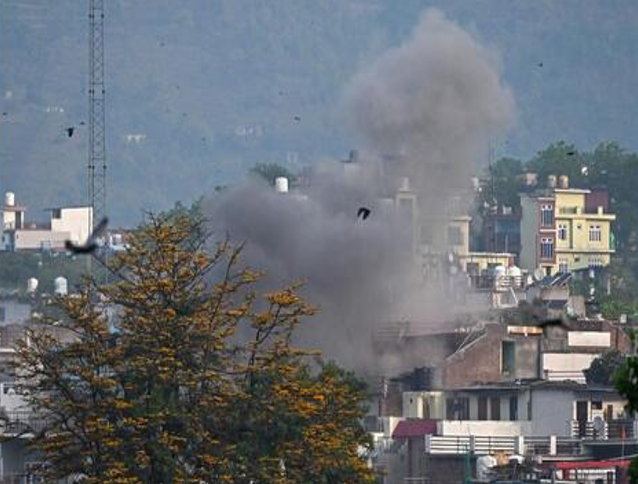
Smoke billows after an artillery shell landed in the main town of Poonch district in India's Jammu region on Wednesday. (AFP)
In a deadly escalation of tensions near the India-Pakistan border, at least 12 civilians were killed and 42 injured after Pakistan launched heavy artillery shelling in Jammu and Kashmir’s Poonch district. The attack followed India’s precision strikes on nine terror targets across Pakistan and Pakistan-occupied Kashmir.
The Indian strikes were in response to a terror attack in Pahalgam on April 22, which claimed 26 lives.
Children and Families Among the Victims
Local police confirmed that four children, aged between seven and 14, were among the dead. Two of them were siblings. The bombardment also took the lives of four members of the Sikh community, including a woman, and a Muslim cleric from the Darul Uloom Madarsa.
Residents described a scene of chaos and heartbreak. Entire families were affected, with homes reduced to rubble. Fear gripped the region as artillery fire pounded villages and towns near the Line of Control (LoC).
Shelling Hits Schools, Religious Sites
The shelling extended beyond rural areas. It reached Poonch town, a region just 20 kilometres from the LoC. A local gurdwara, Sri Guru Singh Sabha, and Christ School were both struck by artillery fire.
"The town is in panic," said Darshan Bharti, a resident evacuating his family to Jammu. “You can see long lines at gas stations. People are rushing to get out.”
Dozens of houses were damaged in the villages of Balakote, Mendhar, Mankote, Krishna Ghati, Gulpur, Kerni, Sagra, and even the district headquarters.
Border Villages Turn into War Zones
The impact was widespread. Shells rained down on civilian homes in border villages, leaving many residents with no choice but to flee. Underground bunkers offered some shelter, but not everyone made it to safety.
Many villagers have begun migrating to Jammu, seeking refuge with relatives. “This is unlike anything we’ve seen in recent years,” said another resident. “It’s not safe to stay.”
Officials Silent, Fear Grows
Attempts to contact Poonch Deputy Commissioner Vikas Kundal and District Police Chief Shafqat Hussain were unsuccessful. Residents say they feel abandoned amid the ongoing conflict.
The identities of those killed reveal the diversity of the affected population. The deceased included:
- Mohd Adil of Sagra
- Saleem Hussain of Balakot
- Balvinder Kour (aka Ruby), 33, of Mankote
- Mohd Zain, 10, of Kalani
- Zoya Khan, 12, also of Kalani
- Mohd Akram, 55, of Mohalla Sukka Katha
- Amreek Singh of Mohalla Sandigate
- Ranjeet Singh and Amarjeet Singh of Sandigate
- Mohd Rafi, 36, of Kojra, Bandichechian
- Mohd Iqbal, 45, of Baila village
The names reflect a grim reality — this attack spared no community or faith.
Tensions Between Two Nuclear Powers
This deadly exchange comes at a time of heightened military tension between India and Pakistan, both nuclear-armed nations. While India targets militant infrastructure, the civilian toll continues to rise on both sides of the border.
For Canadian readers familiar with South Asia or with ties to the region, this tragedy underscores the human cost of long-standing conflict. Innocent lives — children, women, teachers, and clerics — continue to bear the brunt of geopolitical strife.
Crisis Demands Urgent De-escalation
The shelling in Poonch marks one of the deadliest days in recent months. As families mourn and survivors recover in hospitals, the region braces for what could come next.
International observers and peace advocates are calling for restraint and a renewed push for dialogue.
Without immediate steps toward peace, civilians in the border regions will remain caught in the crossfire.















